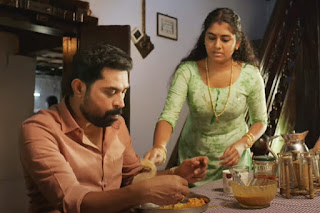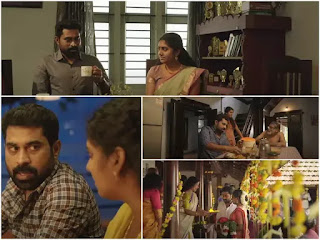Indian Malayalam Film Review
Johnson Thomas
The harsh, unpalatable truth
The Great Indian Kitchen ( streaming on Neestream)
Cast: Nimisha Sajayan, Suraj Venjaramoodu, Ajitha V M, T. Suresh Babu, Ramadevi Kannanchery, Sidhartha Siva, Anupama V. P., Nishitha Kallingal
Director: Jeo Baby
Rating: * * * ½
Runtime: 100 min.
This Jeo Baby film is fast waking up the bucolic Kerala countryside and the rest of India to the reality of Gender Inequality, male entitlement and misogyny in a far more articulate, coherent and strongly evocative manner than any women’s liberation activism ever has. The film has not only garnered rave reviews but also shamed the conscience of many a man seeking entitlement in a traditional setup where the dice is always loaded against the women of the household.
The subject matter Director Jeo Baby is dealing with, is simple. It’s an expose of the inner workings of a traditional household where the hierarchy is set in favour of the men. Micro focused on the Indian (Kerala)Kitchen, the narrative follows the female protagonist from arranged marriage to rebellion with nuanced manifestation of how the patriarchal setup ensnares and ensures subjugation of women all through married life.
The film opens into deliberations and processes involved in an arranged marriage where the girl (Nimisha Sajayan) a product of Gulf returned parents is presented to a man (Suraj Venjaramoodu) whose upbringing is pronouncedly traditional, coming from a well-respected Tharawad(family). The boy and girl have a stilted token conversation before both the families informally agree to conduct the marriage. Both boy and girl are mere puppets to their parents aspirations and have been so conditioned that they accept the role of the elders without question. The ceremony done, we see the new car and a box full of heavy jewellery come home to the boy’s abode. The girl gets a reprieve for the first few days as her mother-in-law is kind enough to give her time to adjust to the new normal. Signs of a not so ideal beginning are evident in the subtle demands placed on her by the husband. It may be on the pretext of love but the expectations of servitude from the girl is clear. When the mother-in-law is called away to care for her own pregnant daughter the responsibility for running the household chores rest solely on the newly minted daughter-in-law. And she is game enough to give it a good try in all earnest…But of course it’s a given that she is bound to be faulted for her less than traditional approach - especially when it concerns her attempts to ease the overload of expectations, her attempt to seek out a job and bodily issues with regards to her menstrual cycle.
The narrative may be linear but it is stingingly lucid in its attempt to lay bare the double standards inherent in tradition and customs. The signs that could elucidate frustration are all evident in the daily drudgery of household chores that the wife is expected to complete. Stark unromanticised images of women going about their tasks under unviable conditions are visible all through. The chopping of vegetables, grinding of rice and preparations for breakfast, cooking of rice over a fireplace, grating of coconuts, washing of utensils, making tea and sweets, hand-washing clothes and repeat … It’s a series of never ending tasks amplified by a unfixed leaking sink – allowing no rest or respite for the protagonist. The not so subtle taunts and reprimands by the two male members bring things to a boil and the woman breaks free from her shackles with a symbolic show of rebellion. But she is just one in a million. Tradition demands that the next victim be readied to take her place in order that patriarchy stands undiminished.
Even without much dialogue, Jeo Baby pulls off a stirring diatribe against the status quo. He factors in some telling sequences as he builds up an impregnable case for women’s empowerment. Most notable among them are the sequences between father-in-law and daughter-in-law and those between husband and wife. There are no harsh words exchanged nor is there any overt display of anger – just a gentle reminder that her role in the family is entirely servile to the men. With uncomfortable, harsh visuals and all-too-brief taunt-laden exchanges, the real picture of an arranged marriage emerges loud and clear. This film is a must-see for everyone!
Johnsont307@gmail.com




No comments:
Post a Comment